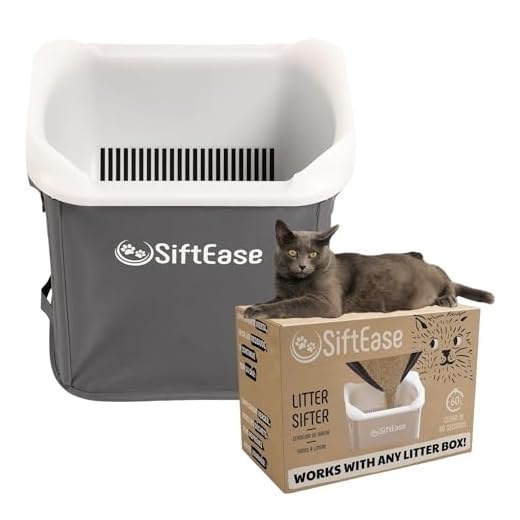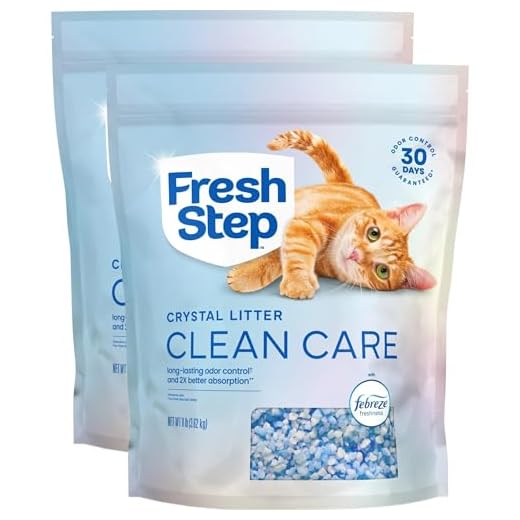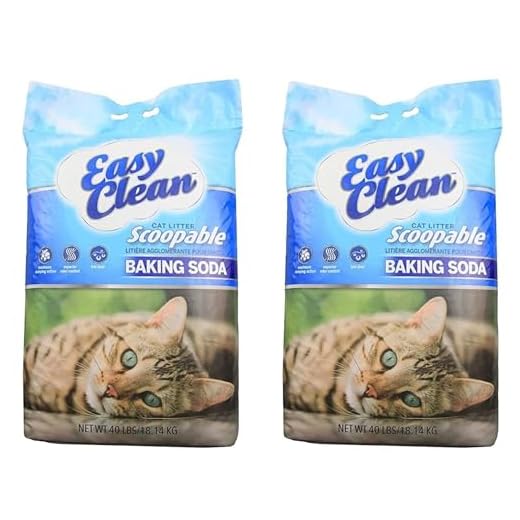



Consider using clumping litter; it helps contain waste and minimizes unpleasant smells. I prefer brands that include natural ingredients like baking soda or activated charcoal for additional odor control. These components absorb moisture and neutralize odors effectively.
Regular cleaning is key. I recommend scooping the litter box daily, removing any clumps and waste immediately. A thorough wash of the box with mild soap and water once a week can significantly reduce lingering scents.
Placement matters too. Ensure the litter box is in a well-ventilated area, away from heavy foot traffic. Good airflow helps disperse odors, keeping my space fresher.
Consider dietary adjustments. Foods with high-quality ingredients can lead to better digestion and less odor. I suggest consulting a veterinarian about suitable options for a balanced diet.
Adding a sprinkle of baking soda on top of the litter can also help absorb odors. It’s a simple trick I’ve found beneficial without altering my litter routine.
Choosing the Right Litter for Odor Control
Opt for clumping materials like bentonite or sodium bentonite. They form solid clumps, making it easier to remove waste and minimize unpleasant smells.
Consider crystal litter made from silica gel. It absorbs moisture effectively and neutralizes odors without the need for constant replacement.
Explore natural options such as pine, corn, or wheat-based litters. These are biodegradable and possess inherent odor-fighting properties.
Look for litters with added activated charcoal or baking soda. These ingredients enhance odor absorption and provide a fresher environment.
Test various textures; some prefer fine granules while others might like larger pieces. Comfort matters, and it can influence usage habits.
Regularly change the litter and clean the box to maintain a fresh atmosphere. Even the best litter needs consistent upkeep to perform well.
Consult online reviews and recommendations from other humans to find the most effective product for your needs.
Implementing a Regular Cleaning Routine for the Litter Box
Cleaning the litter box daily is non-negotiable. I recommend scooping waste at least once a day to prevent odors from building up. Investing in a quality scoop that easily removes clumps can make this task quicker and more efficient.
Consider a thorough clean every week. Empty the entire box, wash it with mild soap and water, and refill with fresh litter. This helps eliminate lingering smells and keeps the environment fresh. Using a mixture of vinegar and water can assist in neutralizing odors effectively.
Placement is key. Position the box in a well-ventilated area. This allows for better airflow, minimizing odors. Avoid placing it near food and water dishes for hygiene reasons.
Regularly check for any changes in health that might affect elimination patterns. If I notice any unusual behaviors, such as straining or blood in waste, it’s time for a vet visit. For more insights on what I munch on, check out if can you give cats bread or what I might hunt, like does cats eat squirrels.
Staying consistent with these cleaning habits not only helps in keeping smells at bay but also promotes a healthier space for both me and my human!
Enhancing Air Quality in Your Home to Reduce Odors
Invest in an air purifier equipped with a HEPA filter. These devices effectively trap particles and allergens, improving overall air quality. Choose a model suitable for your room size for optimal results.
Ventilation Strategies
Open windows regularly to promote fresh air circulation. If weather conditions permit, create cross-ventilation by opening windows on opposite sides of your space. Utilize exhaust fans in kitchens and bathrooms to further eliminate odors.
Natural Odor Absorbers
Place bowls of baking soda or activated charcoal in various rooms. These natural substances absorb unpleasant smells without introducing harmful chemicals. Consider adding houseplants known for their air-purifying properties, such as spider plants or peace lilies, which can contribute to a fresher environment.
Video:
Consider using clumping litter; it helps contain waste and minimizes unpleasant smells. I prefer brands that include natural ingredients like baking soda or activated charcoal for additional odor control. These components absorb moisture and neutralize odors effectively.
Regular cleaning is key. I recommend scooping the litter box daily, removing any clumps and waste immediately. A thorough wash of the box with mild soap and water once a week can significantly reduce lingering scents.
Placement matters too. Ensure the litter box is in a well-ventilated area, away from heavy foot traffic. Good airflow helps disperse odors, keeping my space fresher.
Consider dietary adjustments. Foods with high-quality ingredients can lead to better digestion and less odor. I suggest consulting a veterinarian about suitable options for a balanced diet.
Adding a sprinkle of baking soda on top of the litter can also help absorb odors. It’s a simple trick I’ve found beneficial without altering my litter routine.
Choosing the Right Litter for Odor Control
Opt for clumping materials like bentonite or sodium bentonite. They form solid clumps, making it easier to remove waste and minimize unpleasant smells.
Consider crystal litter made from silica gel. It absorbs moisture effectively and neutralizes odors without the need for constant replacement.
Explore natural options such as pine, corn, or wheat-based litters. These are biodegradable and possess inherent odor-fighting properties.
Look for litters with added activated charcoal or baking soda. These ingredients enhance odor absorption and provide a fresher environment.
Test various textures; some prefer fine granules while others might like larger pieces. Comfort matters, and it can influence usage habits.
Regularly change the litter and clean the box to maintain a fresh atmosphere. Even the best litter needs consistent upkeep to perform well.
Consult online reviews and recommendations from other humans to find the most effective product for your needs.
Implementing a Regular Cleaning Routine for the Litter Box
Cleaning the litter box daily is non-negotiable. I recommend scooping waste at least once a day to prevent odors from building up. Investing in a quality scoop that easily removes clumps can make this task quicker and more efficient.
Consider a thorough clean every week. Empty the entire box, wash it with mild soap and water, and refill with fresh litter. This helps eliminate lingering smells and keeps the environment fresh. Using a mixture of vinegar and water can assist in neutralizing odors effectively.
Placement is key. Position the box in a well-ventilated area. This allows for better airflow, minimizing odors. Avoid placing it near food and water dishes for hygiene reasons.
Regularly check for any changes in health that might affect elimination patterns. If I notice any unusual behaviors, such as straining or blood in waste, it’s time for a vet visit. For more insights on what I munch on, check out if can you give cats bread or what I might hunt, like does cats eat squirrels.
Staying consistent with these cleaning habits not only helps in keeping smells at bay but also promotes a healthier space for both me and my human!
Enhancing Air Quality in Your Home to Reduce Odors
Invest in an air purifier equipped with a HEPA filter. These devices effectively trap particles and allergens, improving overall air quality. Choose a model suitable for your room size for optimal results.
Ventilation Strategies
Open windows regularly to promote fresh air circulation. If weather conditions permit, create cross-ventilation by opening windows on opposite sides of your space. Utilize exhaust fans in kitchens and bathrooms to further eliminate odors.
Natural Odor Absorbers
Place bowls of baking soda or activated charcoal in various rooms. These natural substances absorb unpleasant smells without introducing harmful chemicals. Consider adding houseplants known for their air-purifying properties, such as spider plants or peace lilies, which can contribute to a fresher environment.
Video:
Consider using clumping litter; it helps contain waste and minimizes unpleasant smells. I prefer brands that include natural ingredients like baking soda or activated charcoal for additional odor control. These components absorb moisture and neutralize odors effectively.
Regular cleaning is key. I recommend scooping the litter box daily, removing any clumps and waste immediately. A thorough wash of the box with mild soap and water once a week can significantly reduce lingering scents.
Placement matters too. Ensure the litter box is in a well-ventilated area, away from heavy foot traffic. Good airflow helps disperse odors, keeping my space fresher.
Consider dietary adjustments. Foods with high-quality ingredients can lead to better digestion and less odor. I suggest consulting a veterinarian about suitable options for a balanced diet.
Adding a sprinkle of baking soda on top of the litter can also help absorb odors. It’s a simple trick I’ve found beneficial without altering my litter routine.
Choosing the Right Litter for Odor Control
Opt for clumping materials like bentonite or sodium bentonite. They form solid clumps, making it easier to remove waste and minimize unpleasant smells.
Consider crystal litter made from silica gel. It absorbs moisture effectively and neutralizes odors without the need for constant replacement.
Explore natural options such as pine, corn, or wheat-based litters. These are biodegradable and possess inherent odor-fighting properties.
Look for litters with added activated charcoal or baking soda. These ingredients enhance odor absorption and provide a fresher environment.
Test various textures; some prefer fine granules while others might like larger pieces. Comfort matters, and it can influence usage habits.
Regularly change the litter and clean the box to maintain a fresh atmosphere. Even the best litter needs consistent upkeep to perform well.
Consult online reviews and recommendations from other humans to find the most effective product for your needs.
Implementing a Regular Cleaning Routine for the Litter Box
Cleaning the litter box daily is non-negotiable. I recommend scooping waste at least once a day to prevent odors from building up. Investing in a quality scoop that easily removes clumps can make this task quicker and more efficient.
Consider a thorough clean every week. Empty the entire box, wash it with mild soap and water, and refill with fresh litter. This helps eliminate lingering smells and keeps the environment fresh. Using a mixture of vinegar and water can assist in neutralizing odors effectively.
Placement is key. Position the box in a well-ventilated area. This allows for better airflow, minimizing odors. Avoid placing it near food and water dishes for hygiene reasons.
Regularly check for any changes in health that might affect elimination patterns. If I notice any unusual behaviors, such as straining or blood in waste, it’s time for a vet visit. For more insights on what I munch on, check out if can you give cats bread or what I might hunt, like does cats eat squirrels.
Staying consistent with these cleaning habits not only helps in keeping smells at bay but also promotes a healthier space for both me and my human!
Enhancing Air Quality in Your Home to Reduce Odors
Invest in an air purifier equipped with a HEPA filter. These devices effectively trap particles and allergens, improving overall air quality. Choose a model suitable for your room size for optimal results.
Ventilation Strategies
Open windows regularly to promote fresh air circulation. If weather conditions permit, create cross-ventilation by opening windows on opposite sides of your space. Utilize exhaust fans in kitchens and bathrooms to further eliminate odors.
Natural Odor Absorbers
Place bowls of baking soda or activated charcoal in various rooms. These natural substances absorb unpleasant smells without introducing harmful chemicals. Consider adding houseplants known for their air-purifying properties, such as spider plants or peace lilies, which can contribute to a fresher environment.











